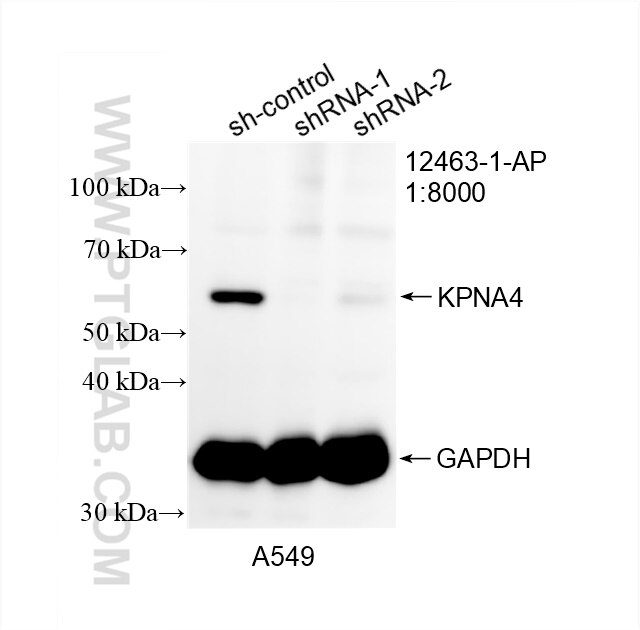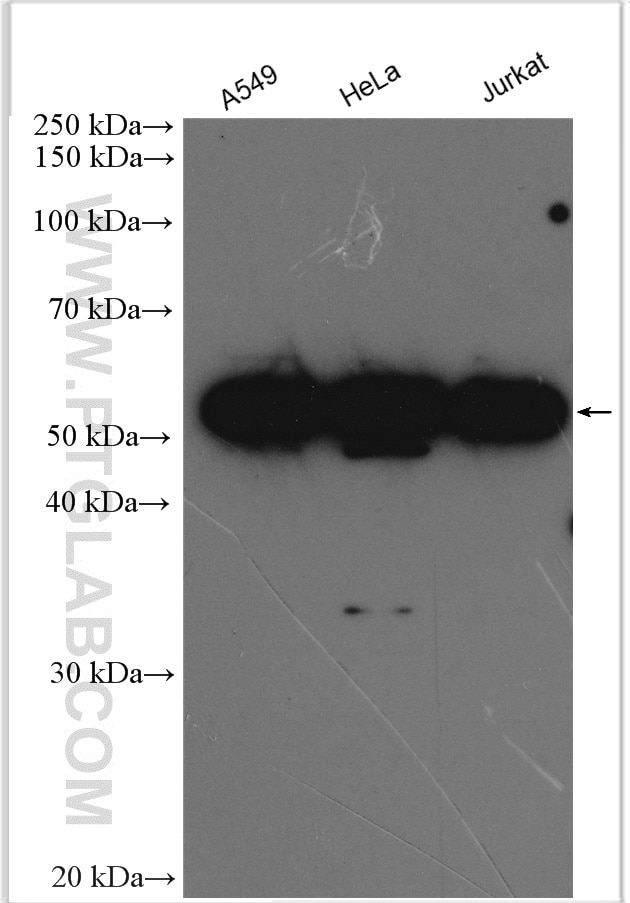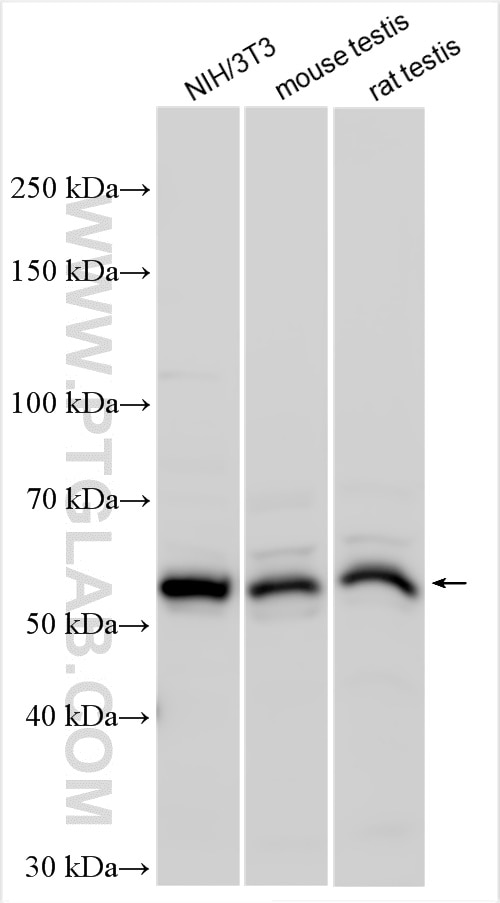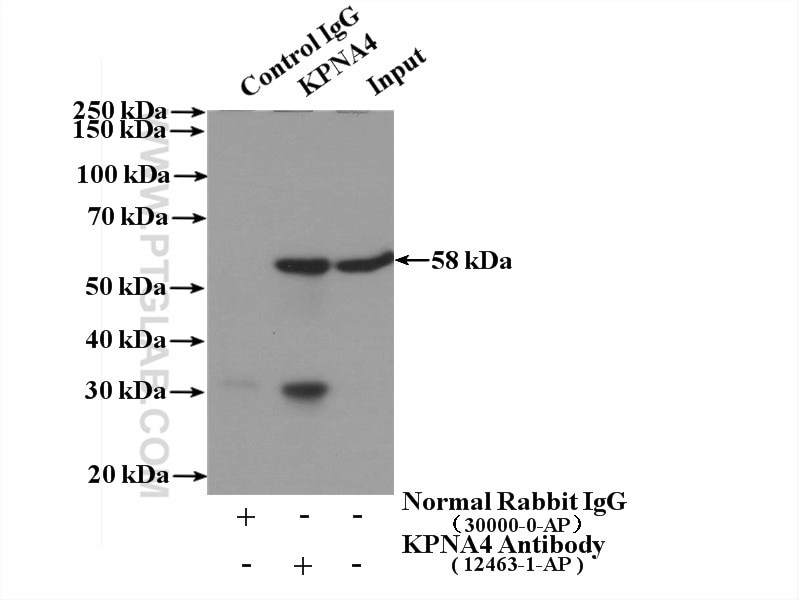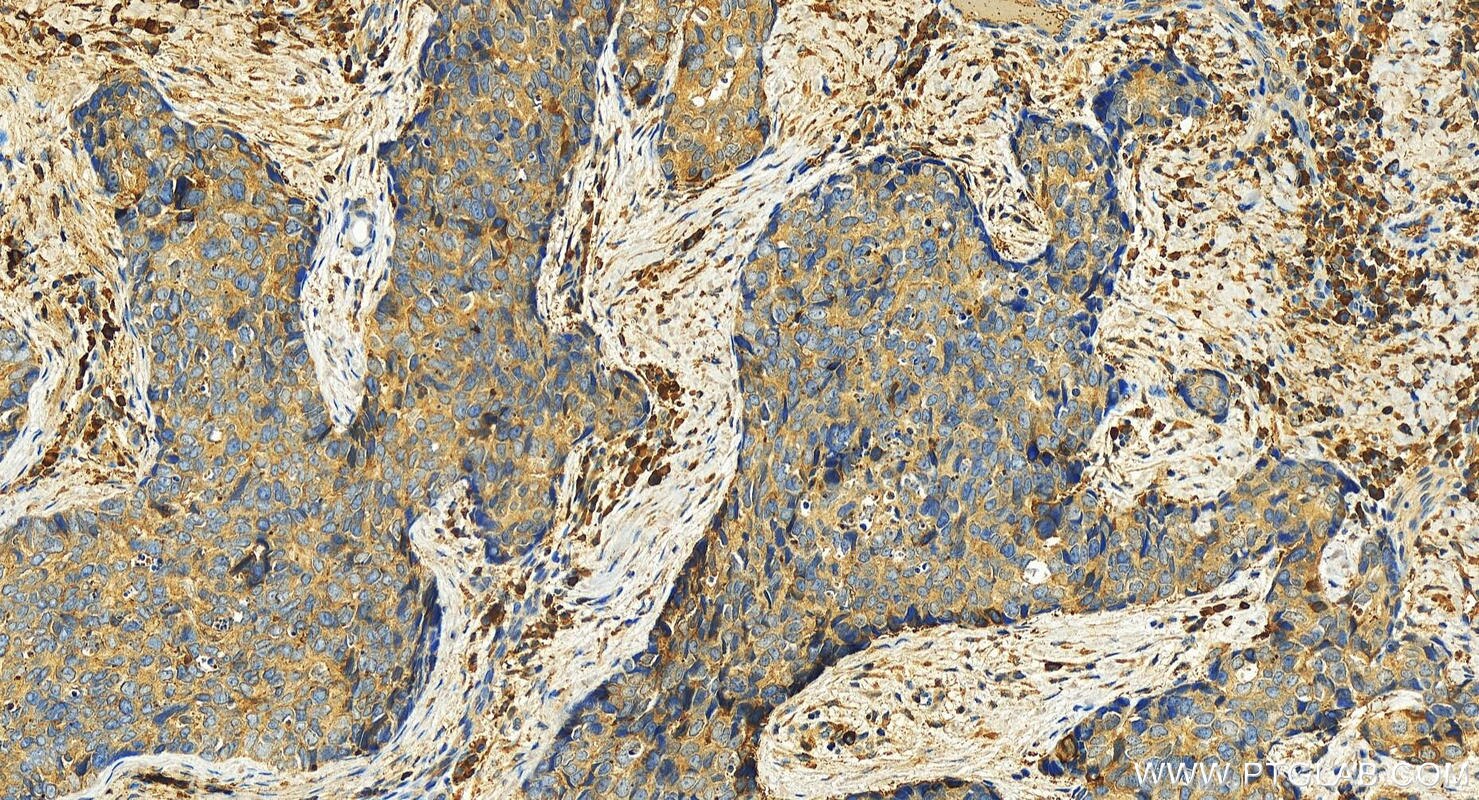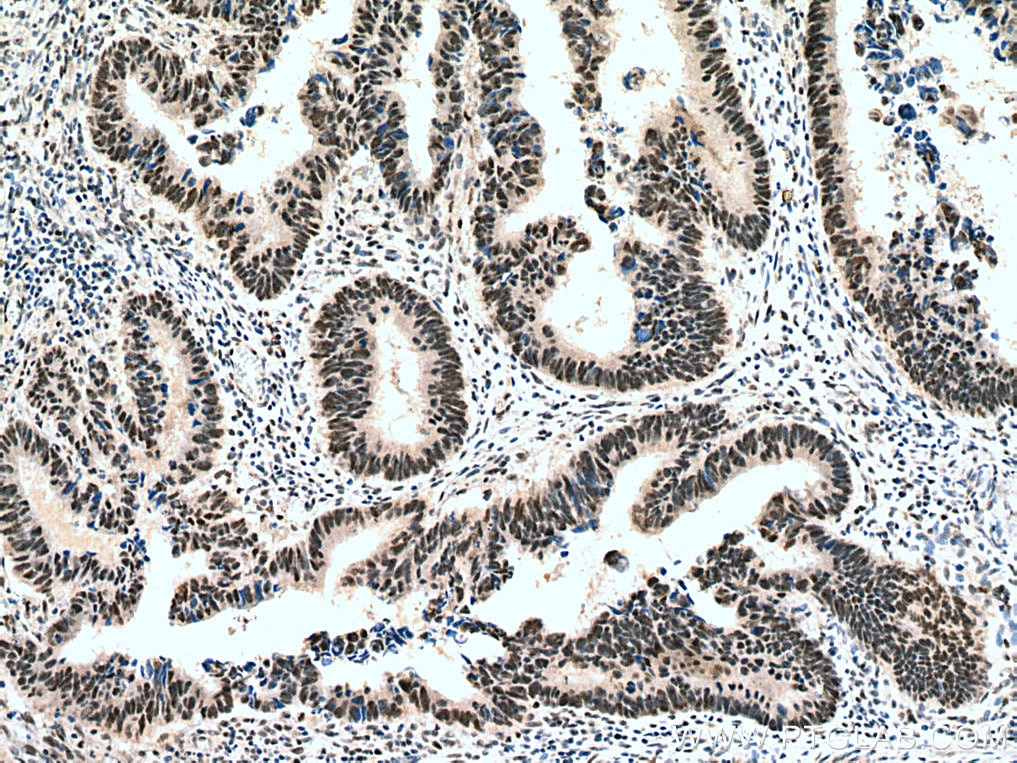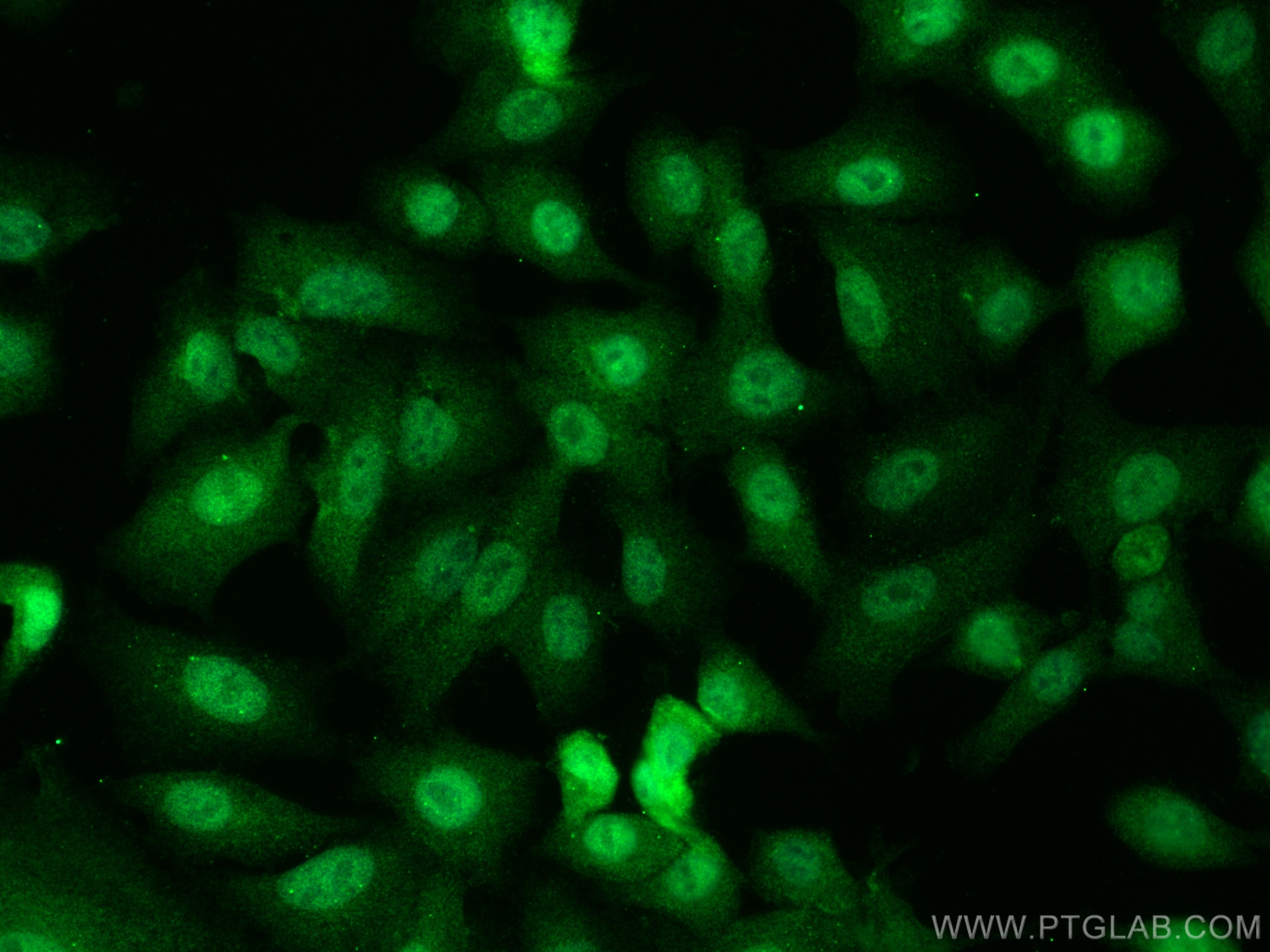- Phare
- Validé par KD/KO
Anticorps Polyclonal de lapin anti-KPNA4
KPNA4 Polyclonal Antibody for WB, IHC, IF/ICC, IP, ELISA
Hôte / Isotype
Lapin / IgG
Réactivité testée
Humain, rat, souris
Applications
WB, IHC, IF/ICC, IP, CoIP, ELISA
Conjugaison
Non conjugué
N° de cat : 12463-1-AP
Synonymes
Galerie de données de validation
Applications testées
| Résultats positifs en WB | cellules A549, cellules HeLa, cellules Jurkat, cellules NIH/3T3, tissu testiculaire de rat, tissu testiculaire de souris |
| Résultats positifs en IP | cellules A549 |
| Résultats positifs en IHC | tissu de cancer du côlon humain, tissu cérébral de souris il est suggéré de démasquer l'antigène avec un tampon de TE buffer pH 9.0; (*) À défaut, 'le démasquage de l'antigène peut être 'effectué avec un tampon citrate pH 6,0. |
| Résultats positifs en IF/ICC | cellules A549, |
Dilution recommandée
| Application | Dilution |
|---|---|
| Western Blot (WB) | WB : 1:1000-1:8000 |
| Immunoprécipitation (IP) | IP : 0.5-4.0 ug for 1.0-3.0 mg of total protein lysate |
| Immunohistochimie (IHC) | IHC : 1:200-1:1000 |
| Immunofluorescence (IF)/ICC | IF/ICC : 1:200-1:800 |
| It is recommended that this reagent should be titrated in each testing system to obtain optimal results. | |
| Sample-dependent, check data in validation data gallery | |
Applications publiées
| KD/KO | See 1 publications below |
| WB | See 8 publications below |
| IF | See 1 publications below |
| CoIP | See 1 publications below |
Informations sur le produit
12463-1-AP cible KPNA4 dans les applications de WB, IHC, IF/ICC, IP, CoIP, ELISA et montre une réactivité avec des échantillons Humain, rat, souris
| Réactivité | Humain, rat, souris |
| Réactivité citée | Humain, souris |
| Hôte / Isotype | Lapin / IgG |
| Clonalité | Polyclonal |
| Type | Anticorps |
| Immunogène | KPNA4 Protéine recombinante Ag3133 |
| Nom complet | karyopherin alpha 4 (importin alpha 3) |
| Masse moléculaire calculée | 521 aa, 58 kDa |
| Poids moléculaire observé | 58 kDa |
| Numéro d’acquisition GenBank | BC034493 |
| Symbole du gène | KPNA4 |
| Identification du gène (NCBI) | 3840 |
| Conjugaison | Non conjugué |
| Forme | Liquide |
| Méthode de purification | Purification par affinité contre l'antigène |
| Tampon de stockage | PBS with 0.02% sodium azide and 50% glycerol |
| Conditions de stockage | Stocker à -20°C. Stable pendant un an après l'expédition. L'aliquotage n'est pas nécessaire pour le stockage à -20oC Les 20ul contiennent 0,1% de BSA. |
Informations générales
KPNA4, also named importin subunit alpha-3, karyopherin-alpha4, is a cytoplasmic protein that recognizes nuclear localization signals (NLSs) and dock NLS-containing proteins to the nuclear pore complex. Nuclear import, mediated in part by karyopherin-α (KPNA)/importin-α subtypes, regulates transcription factor access to the genome and determines cell fate. KPNA4-mediated nuclear transport of Ras-responsive element-binding protein (RREB1), which sustains Ras/ERK pathway signaling through repressing miR-143/145 expression (PMID: 31822798). KPNA4 is one of the main isoforms that is activated in many human cancers. KPNA4 expression was elevated in head and neck of squamous cell carcinoma (PMID: 33188837).
Protocole
| Product Specific Protocols | |
|---|---|
| WB protocol for KPNA4 antibody 12463-1-AP | Download protocol |
| IHC protocol for KPNA4 antibody 12463-1-AP | Download protocol |
| IF protocol for KPNA4 antibody 12463-1-AP | Download protocol |
| IP protocol for KPNA4 antibody 12463-1-AP | Download protocol |
| Standard Protocols | |
|---|---|
| Click here to view our Standard Protocols |
Publications
| Species | Application | Title |
|---|---|---|
Virol Sin African Swine Fever Virus MGF360-12L Inhibits Type I Interferon Production by Blocking the Interaction of Importin α and NF-κB Signaling Pathway. | ||
Oncogene The Wnt/β-catenin/VASP positive feedback loop drives cell proliferation and migration in breast cancer.
| ||
J Neurosci The subcellular distribution of HDAC1 in neurotoxic conditions is dependent on serine phosphorylation. | ||
Tumour Biol Reanalysis of microRNA expression profiles identifies novel biomarkers for hepatocellular carcinoma prognosis. | ||
